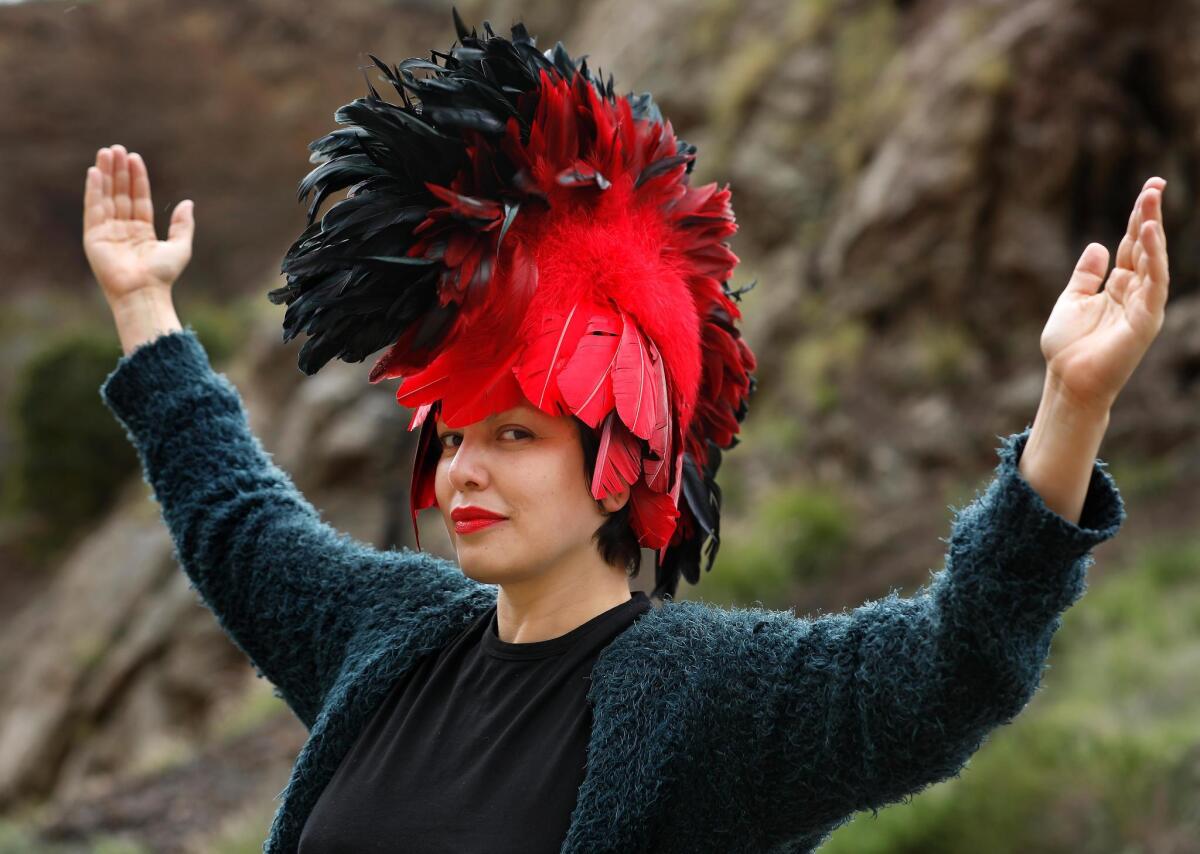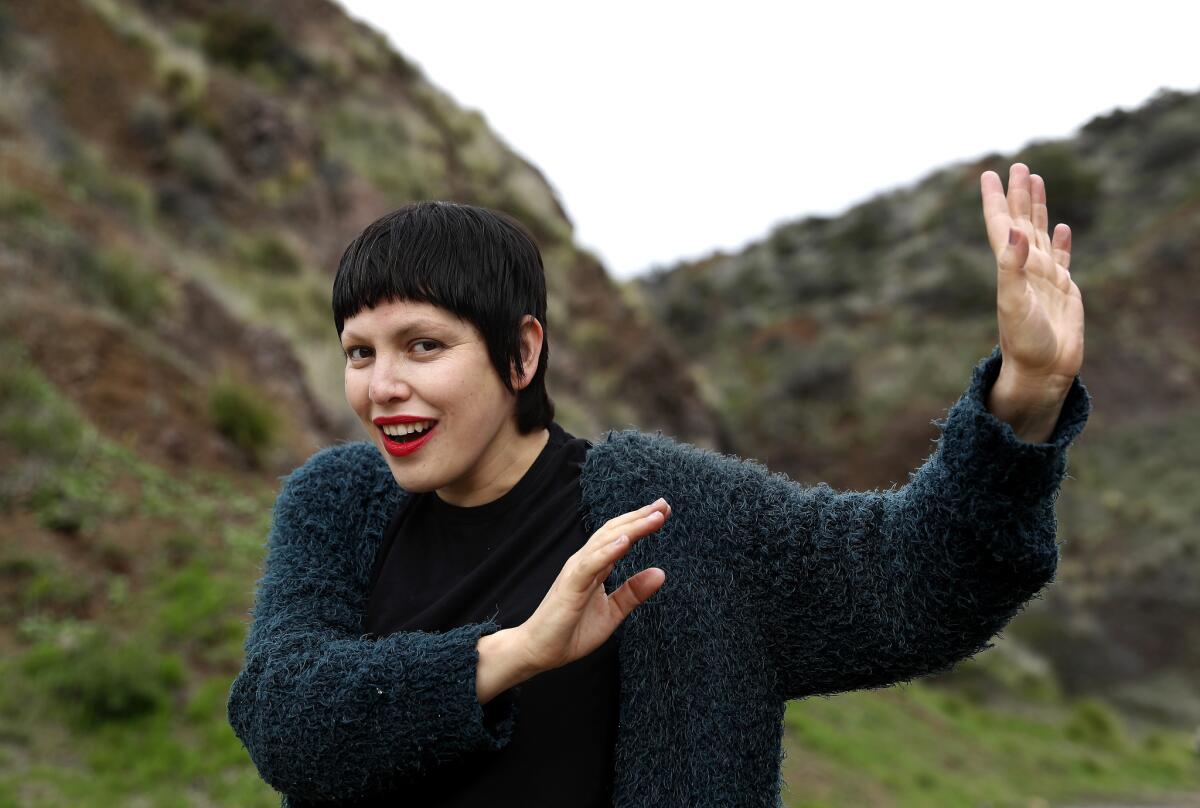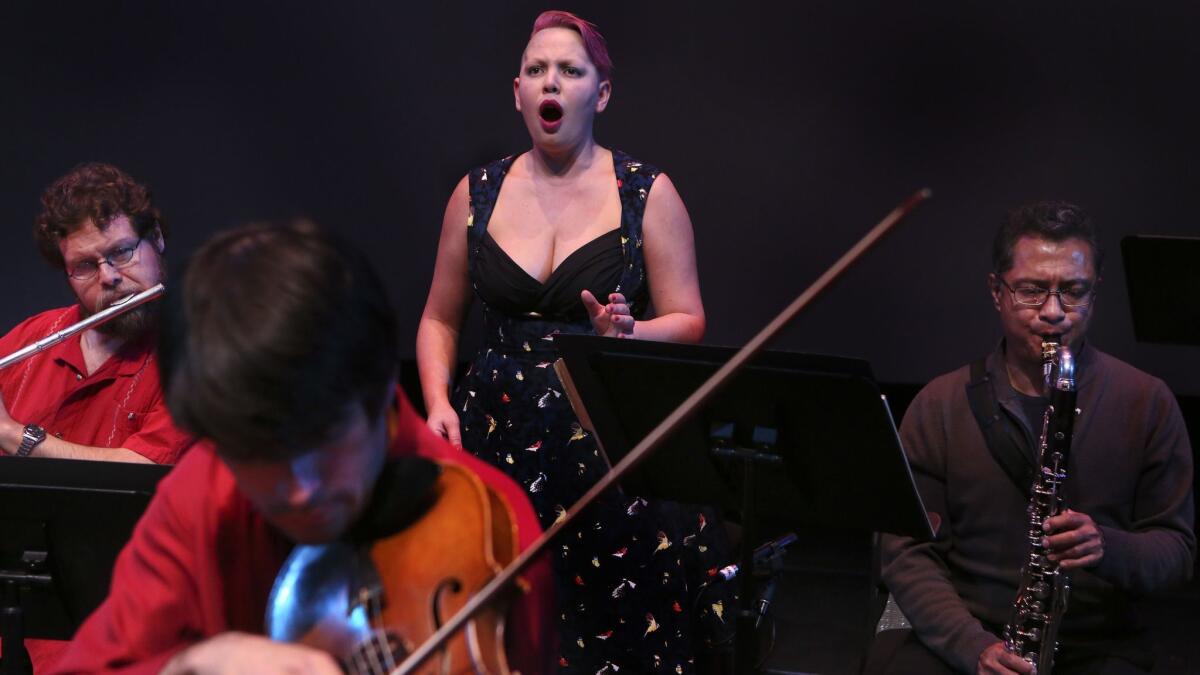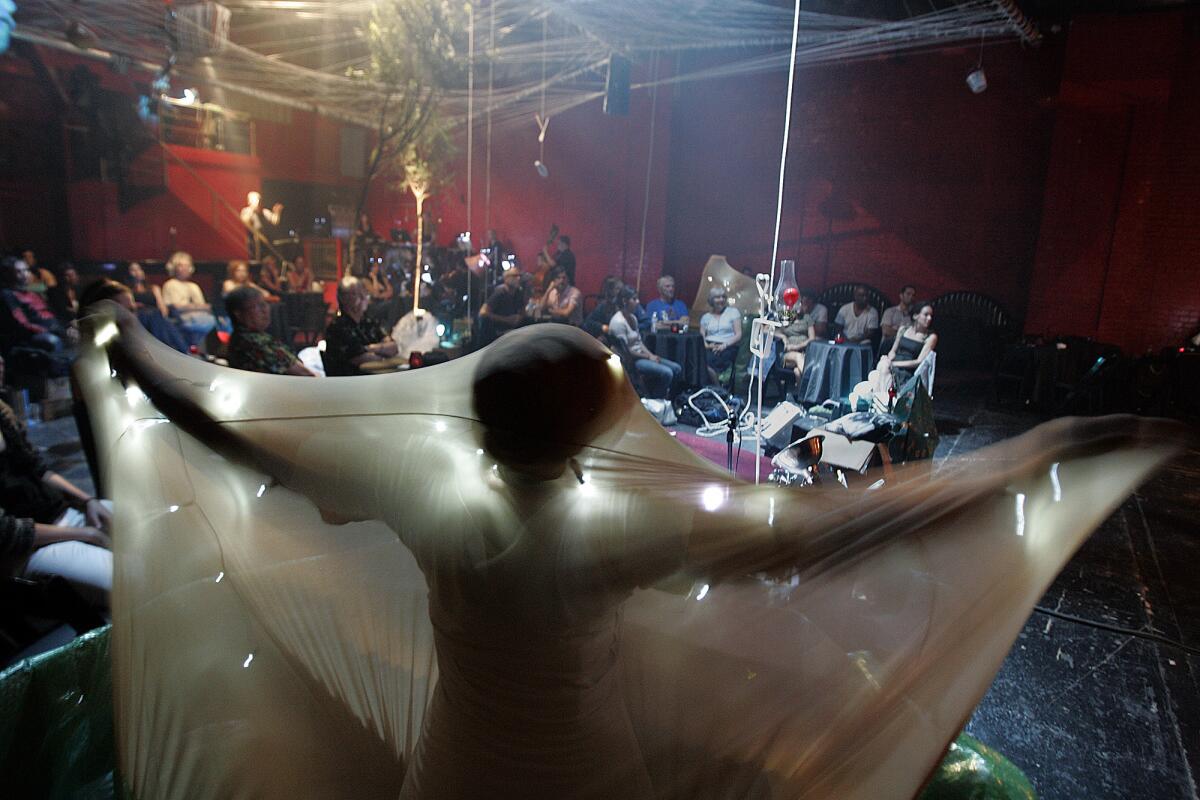Voices of the City: Experimental vocalist Carmina Escobar uses her voice to explore herself and others

- Share via
Cooks in spattered aprons are smoking in the alley as footsteps scrape past, heading down the stairs to a Chinatown basement, where a guy mixes gin and guava near a bullhorn and a blow-up dolphin hanging from a water pipe. Asian music plays, and the dimness has a noir tinge, as if the hatted man in the corner is concealing a small, dark secret.
Carmina Escobar, who can make her voice sound like insects dancing on dry leaves or a rocket ship dying in space, is the night’s headliner, an experimental vocalist and performance artist who long ago fled the strictures of classical music. Before she slips on a bison’s mask and writhes on the floor, she looks around the place, known as Betalevel, and says: “I love it here. It’s like something out of ‘The Art of Forgetting.’ ”
Her set begins. Hissing aliens and cosmic warbles rise from men playing rotating fans, laptops and an electronic frequency instrument. Her mask impervious, Escobar crinkles silver sheets of cellophane while her voice skips into a symphony of magical realism: whispers, cicadas, howls, laughs, yelps, hurricanes and a piercing soprano. The sounds are primal and ethereal; rooted in nature yet otherworldly, as if banshees are conniving with angels. Wild scales and shrieks. And, then, silence.
She pulls off the mask, wipes away sweat and steps beyond a tangle of wires. She packs up. Soon she will be gone, like an apparition, passing the cooks in the alley, and old men in worn suits drifting toward bars on a lonesome winter’s night.
“I have learned the schizophrenic voice. I have many faces,” Escobar said days later over coffee in Valencia, where she teaches at CalArts. “I feel like there’s an ancestral thing that comes. Like my cats, they sit at the window and start chirping and imitating birds. They haven’t practiced or learned that. It just comes out of this memory, this instinctive thing. It makes me think that the sounds I produce come from what was before me. They are coming from some place in our DNA.”
Escobar’s venues echo with her personalities, which are in search of “the otherness,” the internal map across which the voice explores the many-layered self. She has sung beneath an ancient Roman bridge in Portugal; floated in Echo Park Lake while chanting through megaphones as a Oaxacan brass band played on shore; performed a microtonal piece by Mexican composer Julian Carrillo at REDCAT; encouraged her students to speak in tongues; and has given “sonic massages” by singing into the backs and chests of passersby to find the “sweet spot” where the body becomes a tuning fork.

“Carmina has spectacular range and is a compelling performer,” said Jonathan Silberman, a saxophone player who holds concerts at his vintage light fixtures store in Highland Park. “She is extremely adventurous and open-minded, and she brings people together in interesting ways.”

I have learned the schizophrenic voice. I have many faces.
— Carmina Escobar, experimental vocalist
Like many experimental vocalists, Escobar is a collection of guises. Her hair can be neon or dark, shaved or long. She wriggles and struts, throws her arms wide as if ready to fly. She can pout and sneer in a single glance, and her voice, which contains multitudes, comes at you both claw-like and soft, as if it has its own intentions. The other day in Huntington Botanical Gardens — her favorite spot in the Los Angeles area since moving here from Mexico in 2008 — Buddhist monks strolled past a carp pond while Escobar mentioned that sound in the womb is our first sensation.
“Your mother’s voice,” she said. “Where you finish and where I begin. Your voice is a sonic trace of who you are, your identity.”
Such inclinations led her to concentrate on biology in high school; the end dream was to become a documentary filmmaker. But when she was 16, Escobar, who comes from a family of teachers, met a guitar player. “We made weird, shapeless songs together.” She enrolled in the Escuela Superior de Musica del INBA, where she studied music. The classical canon developed her technique but her soul and voice — she was labeled a soprano and mezzo-soprano— felt constricted by what she called music “that’s mostly male, mostly European.”
“It wasn’t the music of Mexico,” she said, “it didn’t come from an ancient place. Nobody had high hopes for me. I built my career out of spite.” She worked with a music therapist, and her inhibitions about unleashing her eclectic range faded. She absorbed sounds and worked on improvisation, listening to Ella Fitzgerald, gender-defying Costa Rican singer Chavela Vargas and the four-octave voice of Peruvian diva Yma Sumac. “I realized I wanted to build my own instrument.”
The urge to experiment — “I like the break-your-speaker kind of noise” — crystallized one night at a cabaret, when a homeless man edged closer to the stage during her performance.
“I was singing. I was passionate,” she said. “At the end he came and hugged me and said, ’Thank you for moving me.’ And I thought, ‘Oh, this is my calling. This is it.’ And then I started searching for more ways to do that and get into that sacred space. It was a very direct way to connect to people.”

I built my career out of spite. . . . I realized I wanted to build my own instrument.
— Carmina Escobar, vocalist
Escobar is an immigrant for whom Los Angeles is familiar and foreign, outlandish and constrained. Her pale skin makes her feel less “the other,” but she occasionally senses a scrim of separation, which she said keeps her rooted to her identity. She bought a car, and like many newcomers read “City of Quartz,” Mike Davis’ examination of the powerful and sinister forces that shaped the city. She moved to Los Feliz, perused Italian philosophy and found bloom on the artistic edges.
“I’ve run very little into the Hollywood-ness of it all,” she said. “It’s a dreamer’s town, you know, a place where cars explode, a lot of accidents.”
Los Angeles has been essential to her growth as an artist, said Wilfrido Terrazas, a Mexican flutist and composer, who has performed with Escobar for a decade and joined her ensemble, Liminar, in 2012.
“L.A. is always fresh, hybrid, interesting. And so is she,” said Terrazas, a bearded man with curly hair. “As a Mexican woman living in California, she is understanding the nature of our heritage and our presence beyond all borders.” He added that Escobar has been “deeply influenced by L.A.'s rich tradition of experimental arts, Latinx culture and multicultural calling. I think it was in L.A. where she discovered she is in fact an undefeatable warrior, and so L.A. has become her main battleground.”
Terrazas said Escobar has pushed him in new directions, including a piece conceived by Escobar in which she had “us moving, humming, carrying flashlights in our mouths and dancing on stage without music. It was so much fun. To her, music must have visual, gestural, kinetic perhaps, components, which allow us to travel to other places.”

In the Wild Beast music pavilion at CalArts, Escobar recently invited performance artist Ron Athey, who was called “a cockroach” in 1994 by Sen. Jesse Helms in an attempt to defund the National Endowment for the Arts, to teach her students about speaking in tongues. Raised in a Pentecostal home, and later a part of the Southern California punk scene, the tattooed Athey, who appears at queer theology conferences, cited the biblical Babel, the poet Virgil, and Appalachian preachers who tame rattlesnakes and tap into the Holy Ghost.
Like much of Escobar’s work, speaking in tongues is as physical as it is musical. Athey, who moved with the ferocity of a snarl or a fist suddenly unclenched, noted there were three symbolic religious stages to the practice: “bleeding in blood,” “rebukes” and “cleansed in fire.” He called the students in a circle. He and Escobar faced one another as if two spiraling spirits, summoning an array of voices — trills, gasps and twisting high and low notes into indecipherable languages. Students joined in, and the pavilion had the air of a séance or a purification rite.

“It’s good to be in those states of discomfort,” she told the class. After the students left, Escobar, who last year went through a relationship breakup, said, “Everyone talks about love as being the leveler, but it’s not really. I feel like pain is the leveler. It’s then that you can empathize with the rest of the world.”
Bringing pieces of the world together is important to Escobar, who on a recent night stood in the glow of 1920s vintage light fixtures in Silberman’s shop, Character Projects. She wore a blunt haircut, dangling earrings and a ’70s-style green, brown and white dress. She poured wine and spoke to Cory Hills, a percussionist with an Amish-like beard whose instruments included a hubcap, thimbles and a pink vibrator. Terrazas, the third member of the trio, examined his flute and pursed his lips.
Escobar slipped into a solo with cow bells, a yellow tube and a battered cassette player; her voice ranged from a bird chirping in the wind to a sound you might hear on a scary night. She, Hills and Terrazas then improvised, Escobar following the pitches and sways of Terrazas’ flute, making her lips sound like rain, sending her voice high and then sliding low, like a moan trembling across bone. She pounded her chest, turning her body into an instrument, and sounded as if she were a fountain, gurgling syllables in shifting octaves and resonances.
Her high notes startled. They were fierce and pure, sounding as if they came from a place where clouds break to blue. She put her face to Hills’ snare, mimicking the beats, and sidled Terrazas and his flute. The sounds spiraled and died; a boisterous, tender universe fell silent. The small audience clapped. A musician, who said he had been playing in bands for 40 years, approached Escobar.
“Man, you’re good,” he said. “I’ve never heard a voice that could do all that.”
She thanked him. They spoke for a bit as another man poured beer into small cups. The vintage lights gave the room the air of an east Berlin salon. The night was cool, and outside, the church, playground, sidewalks, houses and yards were for a moment quiet, until a dog barked, footsteps crossed the street, a girl laughed, a car squealed and sounds curled into one another, like so many strange and enchanting voices waiting to be gathered.
MORE VOICES OF THE CITY
See the most-read stories this hour »
Twitter: @JeffreyLAT
ALSO
Guillermo del Toro's dark, innocent and mystical imagination propels his films
The biggest entertainment stories
Get our big stories about Hollywood, film, television, music, arts, culture and more right in your inbox as soon as they publish.
You may occasionally receive promotional content from the Los Angeles Times.








